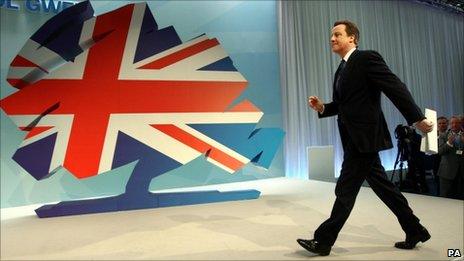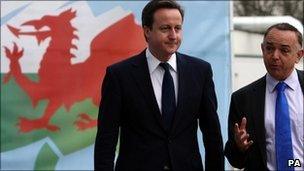David Cameron says Wales not unfairly treated in cuts
- Published

'Cuts in Wales are much less than the cuts in public spending in England' said Mr Cameron
Labour cannot take Wales for granted, Prime Minister David Cameron has said.
Speaking at the Conservatives' spring conference, he promised the UK government would declare war on the "enemies of enterprise".
Mr Cameron has also rejected claims the Westminster coalition was treating Wales unfairly.
Cuts to public spending in Wales were not as bad as those imposed in England, he told the BBC.
In his speech to the conference in Cardiff, which comes ahead of Welsh assembly elections in May, Mr Cameron said: "Let us get out there and show Labour they cannot take Wales for granted."
The Welsh Assembly Government has accused the UK government of hitting Wales harder than the other devolved nations.
But Mr Cameron rejected the accusation in an interview with BBC Wales, saying "difficult decisions" had to be made across the UK because of the "mess we were left by the last government".
"But the cuts in Wales are much less than the cuts in public spending in England," he said.
"In Wales it is a cut of 7.5% over four years - 2% a year. Difficult I know, but not impossible to do. And so I think the funding we've delivered for Wales is fair. "
He hailed the recent announcement of the go-ahead for the £1bn electrification of the Great Western rail line from Paddington to Cardiff - "something Labour never did in a decade".
"I simply don't accept that we have treated Wales unfairly. I have seen a big recovery in Wales, politically for me, and I want to make sure that we deliver for people in Wales and my government is absolutely committed to doing that."
He also defended plans to cut the number of Welsh MPs from 40 to 30 - part of a process that would leave Wales with the same number of MPs per head of population as England.
"That is not unfair, particularly when Wales as well will have a law-making assembly."
He said last week's referendum on the assembly's law-making powers had "settled" the issue and that politicians should now "get on with it" by concentrating on things that matter to people, such as the economy.

David Cameron accompanied by Tory assembly leader Nick Bourne
Following the announcement of the Yes vote on Friday, the UK government has said it will examine the way Wales is funded.
The assembly government has been pressing for reform of the 30-year-old Barnett formula which is used by the Treasury to set the size of its budget.
Chancellor George Osborne told the conference on Saturday the government would look at the financing arrangements and a so-called funding "floor" to protect the assembly's budget from fluctuations in public spending.
Deputy Prime Minister Nick Clegg this weekend raised the possibility of the assembly getting tax-varying powers.
In his speech, Mr Cameron told Tory activists that theirs was the only party promising to protect the NHS in Wales.
The Tories want Wales' health budget to continue to rise in line with inflation, claiming an assembly government decision to freeze funding for the NHS in cash terms amounts to a cut.
But the Conservatives' opponents say the move would force bigger cuts in other areas.
Shadow health minister in the assembly, Nick Ramsay, said: "The NHS is the number one priority of the people of this country. And let there be no doubt, it's my number one priority too."
- Published5 March 2011
- Published6 March 2011
- Published5 March 2011